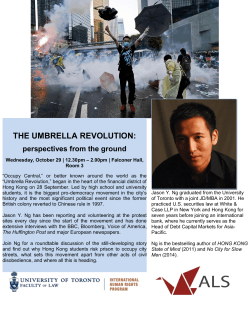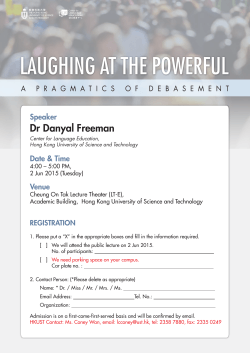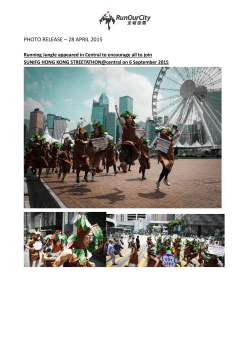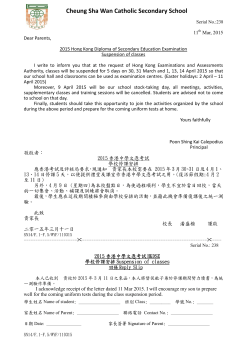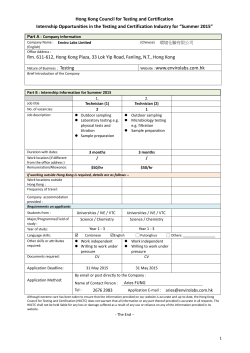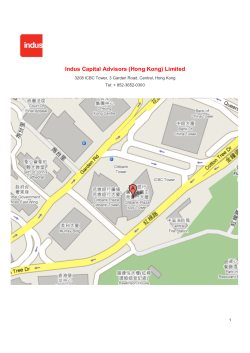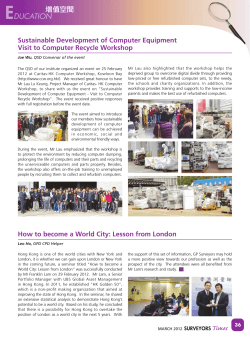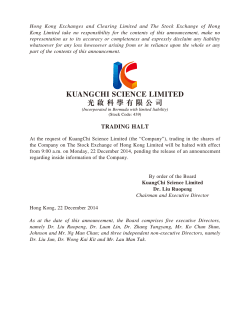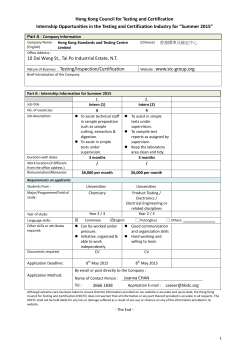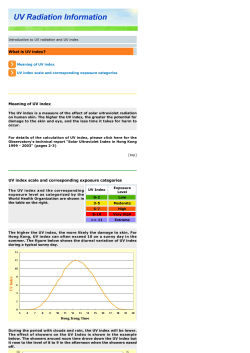
the full event programme here
PROGRAMME OF COMPETITION LAW CONFERENCE 27-28 MARCH 2015 last updated: 26March2015 Competition Law Series „FIGHTING CARTELS UNDER THE HONG KONG COMPETITION ORDINANCE: LESSONS FROM THE EUROPEAN UNION‟ Organisers CUHK Faculty of Law‟s Centre for Financial Regulation and Economic Development European Union Academic Programme Hong Kong Conference Director Prof. Sandra Marco Colino (Chinese University of Hong Kong) Programme Friday, March 27 2015 13:30 - 14:00 REGISTRATION 14:00 - 14:30 WELCOME ADDRESSES Jean-Pierre Cabestan (EUAP Director, Baptist University of Hong Kong) Robin Huang (CFRED Director, Chinese University of Hong Kong) 14:30 - 14.45 KEYNOTE SPEECH The Competition Commission and Cartels Anna Wu (Chairperson, Hong Kong Competition Commission) 14:45 – 16:15 SESSION 1: ASSESSING THE EFFECTIVENESS OF THE HONG KONG COMPETITION ORDINANCE Chair: Marc Waha (Norton Rose) The Effectiveness of Cartel Detection, Prosecution and Punishment under the HK Competition Ordinance Clara Ingen-Housz (Linklaters, Hong Kong) Follow-on Damage Claims: Developments in Hong Kong and the EU Sebastien Evrard (Jones Day, Hong Kong) 16:15 - 16:45 Coffee Break 16:45 - 18:15 SESSION 2: CARTEL INVESTIGATIONS Chair: Thomas Cheng (University of Hong Kong) The Defence's View: Challenges of Responding to EU Cartel Investigations Marc Waha (Norton Rose, Hong Kong) Leniency in Spain: Assessment of Its Implementation Jerónimo Maíllo González-Orús (CEU San Pablo University, Madrid) 1 PROGRAMME OF COMPETITION LAW CONFERENCE 27-28 MARCH 2015 last updated: 26March2015 18:15 - 19:45 Chair: Alison Jones (King‟s College London) SESSION 3: CARTEL ENFORCEMENT IN CHINA AND HONG KONG Cartel Enforcement in the People’s Republic of China Thomas Cheng (University of Hong Kong) Punishing Cartel Behaviour: Means to Encourage Compliance with the Hong Kong Competition Ordinance Sandra Marco Colino (Chinese University of Hong Kong) Saturday, March 28 2015 14:00 - 14:30 BOOK PRESENTATION “Cartels in Asia: Law and Practice” edited by Thomas Cheng, Sandra Marco Colino and Burton Ong 14:30 - 16:00 SESSION 4: SPECIFIC ISSUES RELATING TO CARTELS IN HONG KONG AND THE EU Chair: Cartelisation through Trade Associations: the EU and Hong Kong Burton Ong Experience (National University Kelvin Kwok (The University of Hong Kong) of Singapore) Bid-Rigging in Hong Kong Knut Fournier (City University of Hong Kong) 16:00 - 16:30 Coffee break 16:30 - 18:00 SESSION 5: THE CARTEL OFFENCE Chair: Jerónimo Maíllo González-Orús (CEU San Pablo University) 18:00 - 19:30 The UK Response to the Global Effort Against Cartels: Is Criminalization Really the Solution? Alison Jones (King‟s College London) Issues Relating to Criminal Enforcement: the US and UK Experience Mark Furse (University of Glasgow) SESSION 6: INTERNATIONAL CARTELS: EXTRATERRITORIALITY AND „EFFECT ON TRADE‟ CONCEPT Chair: Extraterritoriality and International Cartels in Singapore Sandra Marco Colino Burton Ong (National University of Singapore) (CUHK) The Interpretation of the Concept of the Effect on Trade Concept by the National Competition Authorities of the “New” EU Member States: Another Legal Partition of the Internal Market? Alexandr Svetlicinii (University of Macau) 19:30 - 20:00 CLOSING REMARKS Prof. Sandra Marco Colino (Chinese University of Hong Kong) 2 PROGRAMME OF COMPETITION LAW CONFERENCE 27-28 MARCH 2015 last updated: 26March2015 Keynote Speaker Speakers The Honourable Anna Wu (Hong Kong Competition Commission) The Competition Commission and Cartels Ms. Anna Wu is a member of the Executive Council and a lawyer. She chairs the Academic Board of the Postgraduate Certificate in Laws of the University of Hong Kong and is a member of the International Advisory Board of the Hong Kong International Arbitration Centre. She previously served as a member of the Legislative Council and as the Chairperson of the Mandatory Provident Fund Schemes Authority, the Equal Opportunities Commission, the Consumer Council and the Operations Review Committee of the Independent Commission Against Corruption. Ms. Wu was also a member of the Law Reform Commission and the Hospital Authority. She was a Director of the Hong Kong Mortgage Corporation Limited and a Non-executive Director of the Securities and Futures Commission. Other speakers (in alphabetical order) Prof. Thomas Cheng (University of Hong Kong) Cartel Enforcement in the People’s Republic of China Summary: This presentation will examine how the Chinese courts and the enforcement authorities, especially the NDRC, have enforced the prohibition against cartels. It focuses on whether the courts and the NDRC have required any demonstration of anticompetitive effects, or are content with a proof of the existence of the cartel arrangement, and whether the courts and the NDRC have entertained any justifications for cartels. Bio: Thomas Cheng is an associate professor at the Faculty of Law of the University of Hong Kong. He received a Bachelor of Arts degree from Yale College, and a Juris Doctor degree from Harvard Law School, and a Bachelor of Civil Law degree in European and Comparative Law from the University of Oxford. His research focuses on competition law and policy issues, especially comparative competition law and competition law in developing countries. He is a member of the Competition Commission, Administrative Appeals Board, the Energy Advisory Committee, and the Committee on Slots Complaints. He has assisted the Hong Kong government in drafting the city's first comprehensive competition law. He is also a member of the executive board of the Academic Society for Competition Law (“ASCOLA”). Mr. Sebastien Evrard (Jones Day, Hong Kong) Follow-on Damage Claims: Developments in Hong Kong and the EU Summary: The presentation will cover: the European Commission's efforts to promote follow-on damages claims; the Directive on antitrust damages action; 3 PROGRAMME OF COMPETITION LAW CONFERENCE 27-28 MARCH 2015 last updated: 26March2015 the Recommendation on Collective Redress; recent case law on access to leniency statements; and some thoughts on the limitations on damage claims under the Hong Kong Competition Ordinance. Bio: Sébastien Evrard handles complex antitrust matters in Asia and the European Union, including merger control, nonmerger investigations, and litigation. His practice also focuses on the antitrust aspects of intellectual property rights. His experience spans a wide range of industries including airlines/aviation, energy/mining, media/entertainment, software/hardware, telecommunications, pharmaceuticals, transport, and fast moving consumer goods (FMCG). Representative clients include Air China, Adobe, American Airlines, Apple, Chevron, Entreprise des Postes et Télécommunications, ICANN, KPN Group, Lam Research, and Procter & Gamble. Sébastien practiced in Brussels, New York, and Beijing before relocating to Hong Kong. Prior to joining Jones Day, he developed experience with all aspects of intellectual property (copyright, trademarks, patents, databases) and information technology (computer law, computer crime, privacy, and ecommerce). He is a coauthor of Anti-Monopoly Law and Practice (Oxford University Press, 2011), a treatise on competition law in China, and Competition Law In China: Laws, Regulations, and Cases (Oxford University Press, 2014). He also has published several articles related to competition, intellectual property, and information technology law; is a frequent speaker at international conferences; and has served on the board of the Brussels Young Bar Association. Mr. Knut Fournier (City University of Hong Kong) Bid-Rigging in Hong Kong Summary: I will discuss the pre-Ordinance cartel cases in Hong Kong. Through a look at COMPAG cases (laundry shops, driving lessons...) and bid-rigging court cases (Tai Po Market and Gammon) I try to understand how these early cases have shaped the need for and the format of the Competition Ordinance. A loo at recent cases in Malaysia help to understand how some of the bid-rigging cases that call for competition law enforcement cannot be solved by an incomplete competition legislation. Bio: Knut Fournier is teaching law at the City University of Hong Kong and finishing a PhD in competition law at the University of Leiden. Prior to moving to Hong Kong, Knut worked as a monitoring trustee for competition authorities in Europe, in the United States, in Brazil and in China. He published extensively on competition law, including recently on Hong Kong telecom merger remedies, and on competition policy and the Hong Kong broadcasting sector. He holds law degrees from the University of Paris and from King College London. Last year, Knut was an Academic Visitor at the University of Oxford. He is currently the Chairperson of the Hong Kong Competition Association. Prof. Mark Furse (University of Glasgow) Issues Relating to Criminal Enforcement: the US and UK Experience 4 PROGRAMME OF COMPETITION LAW CONFERENCE 27-28 MARCH 2015 last updated: 26March2015 Summary: My presentation focusses not on the question whether criminal sanctions should be applied to cartelists at the individual level – I take that as a starting point, but rather, with the focus on jail sentences; (1) what the United States‟ („US‟) experience tells us; (2) how the experience of criminalising cartel participation has developed in the UK; and (3) how might a criminalisation project respond to the challenges evidenced. Because criminalisation has worked effectively in one context does not mean that it will do so in a different context. The United Kingdom („UK‟) experience has been disappointing, and this is not only driven by the fact that its law sits alongside European Union („EU‟) competition law, a complicating factor that is not faced by the US enforcement authority (the Department of Justice („DOJ‟)). I will deal first with the experience in the US; then with the experience in the UK with reference to the Enterprise Act 2002 („EA02‟) and the Cartel Offence; then offer some conclusions. Bio: Mark Furse is Professor of Competition Law and Policy at the University of Glasgow. Mark has masters degrees in both Law and in Economics, and has been working with competition law for 30 years. Mark has taught at some of the world‟s leading universities, including the London School of Economics, Hong Kong University, Yonsei University in Seoul, and Lund University in Sweden. He is currently a Senior Fellow at The University of Melbourne. Mark has been involved in judicial training and in institutional capacity building in the area of competition law. Mark has particular interest in the UK competition law system, and in the Chinese system. He is joint editor of the United Kingdom Competition Law Reports, and a general editor of Butterworths Competition Law Service. He is also on the editorial boards of the European Competition Journal, and the European Competition Law Review. He wrote the first six editions of one of the leading English language student textbooks in competition law, Competition Law of the EU and the UK. Mark has paid particular attention to the criminalisation of competition law in the UK, his most recent book being The Criminal Law of Competition in the UK and in the US: Failure and Success (2012, Edward Elgar). Ms. Clara Ingen-Housz (Linklaters, Hong Kong) The Effectiveness of Cartel Detection, Prosecution and Punishment under the HK Competition Ordinance Summary: I will review and assess the expected effectiveness of the administrative and judiciary procedures set out in the Ordinance with regards to enforcement against hard-core cartels at detection, prosecution and punishment stages. To “stress-test” the Hong Kong proposed regime, I will use a comparative approach looking at methods which have proven to be successful in a European context as well as practices which have been less satisfactory. I will finish by making suggestions with a view to maximise the efficiency of the proposed procedure in Hong Kong. 5 PROGRAMME OF COMPETITION LAW CONFERENCE 27-28 MARCH 2015 last updated: 26March2015 Bio: A partner based in Hong Kong, Clara leads Linklaters‟ Asia competition and antitrust law practice. She advises multinational companies on Asian competition law issues, and Asian companies on global antitrust matters. Her experience of close to 15 years spans three continents. In Europe, she was a member of the Competition Department of the Legal Service at the European Commission, advising and litigating on behalf of the Commission on merger, cartel and abuse cases in a wide range of industries. In the United States, she practised for close to ten years at top-tier New York firms, focusing on US merger control and private antitrust litigation. In Asia since 2010, Clara has developed a strong regional competition practice with specific expertise in China and Hong Kong. As a former official, she has long standing working relationships with regulators across the region and has been involved in transactions and investigations in a number of jurisdictions including China, Singapore, Vietnam, Indonesia, Korea, Taiwan, Australia. She has significant experience in multijurisdictional merger filings, anti-competitive agreements, dominant firm analysis, distribution network structuring and compliance. She also has a broad array of industry knowledge, including in the insurance and financial services, pharmaceutical, energy/natural resources and IT sectors. Prof. Alison Jones (King‟s College London) The UK Response to the Global Effort Against Cartels: Is Criminalization Really the Solution? Summary: The article presented examines the global effort against hard core cartels and, in particular, the increasing tendency for states to introduce criminal cartel regimes. It notes that, despite this tendency, few jurisdictions, aside from the US, have been successful in imprisoning individuals involved in cartel conduct. The article considers why this might be, focusing on the difficulties and problems that have been encountered with the criminal cartel offence in the UK. The article discusses both theoretical and practical obstacles which appear, up until now, to have undermined the force and effectiveness of the UK regime and led to concerns about its scope. Given the difficulties identified, the article concludes that caution should be exercised before a state, intent on increasing deterrents to cartel activity, decides to criminalize such conduct. Rather, it recommends that such jurisdictions should consider not only criminalization of cartel activity but whether steps to enhance civil enforcement might be a preferable and more efficient solution for increasing the force of, and respect for, cartel rules. Bio: Alison Jones is Professor of Law at King‟s and a solicitor at Freshfields Bruckhaus Deringer LLP. Prior to joining King's in 1992, Alison read law at Girton College, Cambridge, worked at Slaughter & May and completed a BCL at Christ Church, Oxford. Since joining King‟s she has taught Competition Law (EU, UK and US), Trusts, Property, and EU law. Alison is co-author of Jones and Sufrin on EU Competition Law, a Regional Editor for The Restitution Law Review and writes two of the Centre of European Law‟s modules for the Diploma in EU competition law. She is also Director of the LLB Law with European Legal Studies programme. 6 PROGRAMME OF COMPETITION LAW CONFERENCE 27-28 MARCH 2015 last updated: 26March2015 Mr. Kelvin Kwok (University of Hong Kong) Cartelisation through Trade Associations: the EU and Hong Kong Experience Summary: Indirect cartelisation through trade associations is a common phenomenon in both Hong Kong and the EU. This presentation will look at past examples of trade association cartelisation in Hong Kong, the EU and elsewhere, and how they have been or can be tackled under their legal regimes. This presentation will highlight potential differences between Hong Kong law and EU law as they relate to trade association cartelisation. Bio: Kelvin Kwok, Assistant Professor of Law, University of Hong Kong (HKU), specialises in competition law, intellectual property law, tort law, and law and economics. A graduate of HKU and the University of Chicago, he taught briefly at the HKU Faculty of Business and Economics before joining the Faculty of Law in August 2012. Kelvin has served as the Deputy Director of the BBA Law double-degree programme, a HKU team coach for the Oxford International Intellectual Property Moot, and a co-opted member of the Hong Kong Consumer Council. He is regularly consulted to advise on legal matters relating to competition law and interviewed by the local media on competition law issues. Prof. Jerónimo Maíllo González-Orús (CEU San Pablo University, Madrid) Leniency in Spain: Assessment of Its Implementation Summary: Leniency for cartel fines was introduced in Spain in 2008. Since then, 19 decisions of the Spanish antitrust authority have dealt with the possibility of granting immunity or a reduction of a cartel fine. This contribution will review and assess both the design and implementation of the Spanish leniency program. Regarding design, the Spanish program have as sources of inspiration the EU leniency program (as explained in the 2006 EC Leniency Notice) and the ECN Leniency Programme (as revised in November 2012). Its main characteristics can be summarized as follows: first, regulation at a triple level (parliamentary act, secondary regulation and soft law); second, just for cartels (as defined by the parliamentary act); third, only administrative leniency; fourth, for both undertakings and their directors; fifth, both immunity and reductions are available (also partial exemptions); sixth, both the arrival order and the level of information/evidence provided are the crucial factors to obtain leniency; seventh, respect of the cooperation and good faith duties are indispensable for leniency applicants; eighth, only cartelists who coerce others to participate in the cartel are excluded from immunity; they can nevertheless benefit from a fine reduction. These characteristics will be the axes to present and explain the Spanish program. Regarding implementation, the contribution will look into the 2013 Spanish Leniency Notice and above all on the 19 decisions adopted by the Spanish 7 PROGRAMME OF COMPETITION LAW CONFERENCE 27-28 MARCH 2015 last updated: 26March2015 Antitrust authority to detect how the aforementioned principles have been applied and interpreted, where difficulties or controversies have arisen and how they have been solved. The analysis will also focus on other issues such the profile of the applicant, the type of cartel detected, domino‟s effects or the percentage of cartel infringements whose detection is originated in a leniency application. I will end with an assessment of the final outcome and its present and future challenges. Punctual references will be made to EU Leniency, where appropriate, at the level of design, implementation and assessment. Bio: Prof. Maíllo González-Orús is full-time Associate Professor of European Union Law at the Law School (CEU San Pablo University, Madrid) and Head of the Public Law Department. He is Senior Research Fellow at the Institute for European Studies and Coordinator of its Centre for Competition Policy, where he coordinates a Master in International Business Law and a Master in European Union (and its related PhD Program in European Studies). He holds an LLM with honors on EU Law from the College of Europe (Bruges), was a PhD researcher at the European University Institute (Florence, Italy) and is Doctor in law with honors (European Doctorate) at CEU San Pablo University. His research interest focuses on competition law and on other aspects of economic regulation, both in Europe and in other world areas. He has been appointed as an EU Competition Law and Single European Market expert in several international training and research projects. He has published extensively in the area of Competition Law (author of a monograph and a textbook, editor of 12 other books, and author of more than 35 articles in legal journals and book chapters). He is currently leading a research project on The Fight against Cartels in Spain and in Europe, financed by the Spanish Ministry of Economy and Competitiveness Dr. Sandra Marco Colino (Chinese University of Hong Kong) Punishing Cartel Behaviour: Means to Encourage Compliance with the Hong Kong Competition Ordinance Summary: This contribution assesses the effectiveness of the Hong Kong Competition Ordinance by focusing on how cartel activity is punished. It will discuss whether such punishment is suitable to efficiently deter this kind of anticompetitive activity. The Ordinance has introduced an array of sanctions which are traditionally used in competition regimes around the world. When a company is found to have breached the CO, remedies and pecuniary penalties may be imposed on the corporation. In addition, individual sanctions are also contemplated, and directors may be disqualified in certain cases. Interestingly, harsher sanctions may be imposed on individuals who breach the procedural rules, including fines and even imprisonment. Despite the enthusiasm surrounding the long-awaited implementation of the cross-sector legislation, the complex adoption process has considerably weakened the sanctions available under the new law. The presentation will explore ways in which these penalties can be used to their full potential. 8 PROGRAMME OF COMPETITION LAW CONFERENCE 27-28 MARCH 2015 last updated: 26March2015 Bio: Sandra Marco Colino joined the Faculty of Law of the Chinese University of Hong Kong in 2010, and has been an Assistant Professor since 2013. She is the Deputy-Director of the European Union Academic Programme in Hong Kong, and the Director of the Centre for Financial Regulation and Economic Development. Before moving to Hong Kong she was a Lecturer in EU Law at the University of Glasgow. Her main teaching and research interests lie in the fields of competition law, communications law, EU law and the regulation of gambling. In 2007 she was awarded a PhD from the European University Institute in Florence. She also holds an LLM in EU Law from the Universidad Carlos III of Madrid. A qualified lawyer in Spain and a member of the Madrid Bar, Dr. Marco Colino has been a trainee at the European Commission and the law firm 'Miguel Cid y Asociados'. She has been a Visiting Scholar at UWMadison, UC Berkeley, the University of Melbourne and the University of Birmingham. She is the Hong Kong news correspondent for the European Competition Law Review. Prof. Burton Ong (National University of Singapore) Extraterritoriality and International Cartels in Singapore Summary: 2014 saw two landmark competition law infringement decisions issued by the Competition Commission of Singapore (CCS) against foreign parties with Singapore subsidiaries, with the harshest penalties imposed by the CCS since its inception in 2006. This presentation will examine the various bases on which liability was imposed on these foreign parties for (1) anticompetitive conduct outside of Singapore; and (2) anti-competitive conduct within Singapore perpetrated by their local subsidiaries. It will also examine some of the distinctive features of these cartel cases compared to the more prosaic infringement decisions of the CCS in previous years." Bio: Dr Burton Ong, LLB (NUS), DPhil/BCL (Oxon), LLM (Harv) is an Associate Professor at the Faculty of Law of the National University of Singapore where he teaches and researches in the areas of Competition Law, Intellectual Property and Contract Law. He is the Director of Competition Law Research at the Centre for Law and Business and a consultant to both public and private sector clients in matters relating to competition law and policy in Singapore. Together with Thomas Cheng and Sandra Marco Colino, he is an editor of, and contributor to, "Competition Law and Cartels: An Asian Perspective" (forthcoming, Kluwer). Dr. Alexandr Svetlicinii The Effect on Trade Concept in the EU Summary: Regulation 1/2003 has recently celebrated its tenth anniversary. By empowering national courts and national competition authorities (NCAs) to directly enforce Articles 101-102 of the Treaty of the Functioning of the European Union (TFEU), Regulation 1/2003 has substantially increased the degree of enforcement of EU competition rules: nowadays, most of the decisions sanctioning breaches of Articles 101-102 TFEU are adopted by the NCAs, rather than by the EU Commission. Under Article 3(1) Reg. 1/2003, NCAs must apply Articles 101-102 TFEU when the anti-competitive practices “may 9 PROGRAMME OF COMPETITION LAW CONFERENCE 27-28 MARCH 2015 last updated: 26March2015 affect trade between Member States”. During the last decade, the NCAs from the “old” EU Member States have notified a larger number of the envisaged decisions to the EU Commission in comparison to the NCAs of the “new” EU Member States. The lower number of notifications might thus be due to a “narrower” interpretation of the concept of intra-community trade by the NCAs of the “new” EU Member States, rather than due to the lack of resources or independence of these authorities. The paper aims at verifying this hypothesis by analyzing the interpretation of the concept of intra-community trade by the NCAs of seven jurisdictions selected among the “new” EU Member States, which have joined the EU in 2004 (i.e. Poland, Czech Republic, Slovakia and Estonia), 2007 (Bulgaria and Romania) and 2013 (Croatia). Contrary to the impression provided by the official statistics of the European Competition Network, the paper claims that the NCAs of the “new” EU Member States are not “less active” in competition enforcement, but they have rather relied on the national rather than EU competition law as legal basis for their infringement decisions. The reliance on the national competition law as legal basis is explained by a “narrow” interpretation of the concept of intra-community trade in comparison to the EU Guidelines and the relevant ECJ case law. Bio: Alexandr Svetlicinii is an assistant professor at the University of Macau, Faculty of Law, currently also Acting Programme Coordinator of Master of International Business Law in English Language. Dr Svetlicinii received his law degree at the Free International University of Moldova (Chisinau), LL.M International Business Law (Cum Laude) with specialization in EU law at the Central European University (Budapest), Master of Research (Law) at the European University Institute (Florence) and PhD in Law at the European University Institute (Florence) with the doctoral dissertation titled “Assessing Non-Horizontal Mergers: the Role of Legal Rules and Integration of Economic Analysis”. Prior to joining the University of Macau, Dr Svetlicinii has completed his post doc research project titled “Transplantation of the EU competition rules and standards in a small market economy: case of Estonia from regional, EU and international perspective” as a Senior Research Fellow at the Tallinn University of Technology, Tallinn Law School. Dr Svetlicinii currently is currently a member of the following professional associations: Competition Law and Regulation Academic Network, International League of Competition Law, Academic Society for Competition Law, Asian Competition Forum, Italian Society of Law and Economics, Competition Law Scholars Forum, and European Law Institute. Research interests include: comparative competition law, contract law, international business law and international economic law. Mr. Marc Waha (Norton Rose, Hong Kong) The Defence's View: Investigations Challenges of Responding to EU Cartel Summary: The presentation highlights the challenges facing Asian companies in their response to EU cartel investigations. From a substantive law perspective, the prevalence of manufacturing and marketing joint ventures as well as the loose forms of organisation of corporate groups in Asia give rise to particular issues under the single economic unit doctrine. What may be regarded as anticompetitive collusion under EU law may be perceived as 10 PROGRAMME OF COMPETITION LAW CONFERENCE 27-28 MARCH 2015 last updated: 26March2015 intragroup dealings by Asian businesses. Turning to procedural issues, responding to a cartel investigation presents discrete corporate governance, language, cultural and business challenges for Asian companies, which are often slower to respond than their European counterparts. These will be illustrated by way of practical examples in the context of leniency and settlements procedures. Bio: Marc Waha is a partner in Norton Rose Fulbright‟s the Asia Antitrust Competition Team, based in Hong Kong. He also spends a significant amount of time in Europe, representing Asian clients before the EU competition authorities. Marc advises international companies on emerging antitrust regimes in East Asia, and Asian companies on global competition compliance issues, multijurisdictional merger filings and international cartel investigations including in Asia. He has represented US, European and Asian clients active in a number of industrial sectors. His cartel work experience spans the air transport, automotive, food, elevator, beverage, plasterboard, and chemicals industries. He has also worked on a number of competition matters in Europe involving alleged abuses of dominant position, cartel-like behaviour and state aid, representing defendants before the European and national regulators as well as before the General Court of the EU. Marc regularly publishes and speaks at conferences on competition law issues of relevance to Asia. He and the competition team have been involved in training programmes for Asian competition regulators. Marc is ranked as a leading lawyer, and our Asia Competition Team as a top tier competition practice, in several guides including Chambers‟ Asia Pacific’s Leading Lawyers for Business, Euromoney‟s Guide to leading lawyers, the Guide to the World’s Leading Competition and Antitrust Lawyers, PLC‟s Which Lawyer?, Asialaw‟s Leading Lawyers, Chambers Asia-Pacific and The International Who’s Who of Competition Lawyers & Economists. Marc is a member of the Bar in Brussels and New York. He is a registered foreign lawyer in Hong Kong. 11
© Copyright 2025
